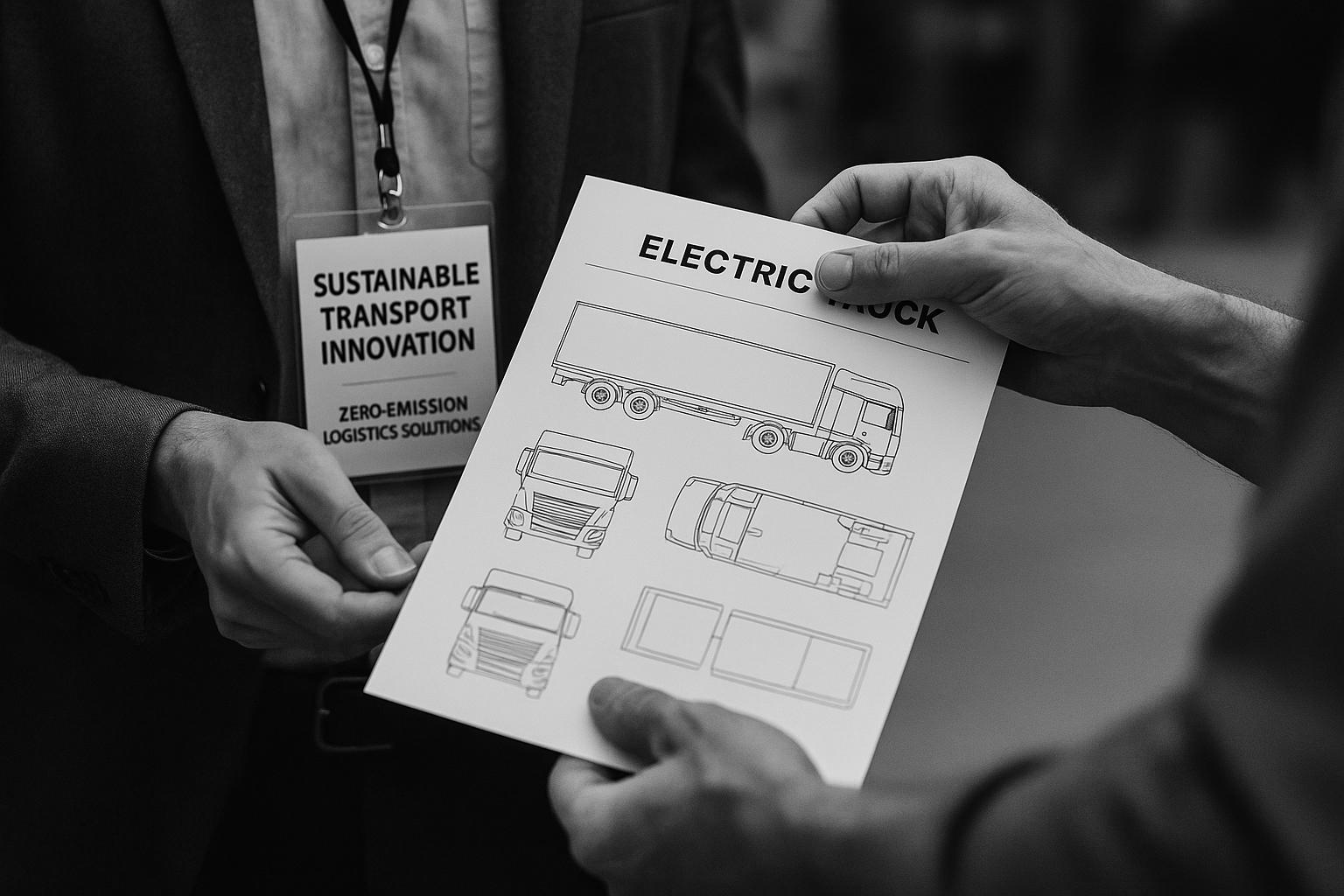Jesse Prendergast of Innovate UK Business Connect will detail progress on the £200m ZEHID initiative, highlighting deployment of battery-electric and hydrogen HGVs alongside new strategic charging hubs designed to accelerate the UK’s shift to zero-emission logistics.
Jesse Prendergast, knowledge transfer manager at Innovate UK Business Connect, is set to share insights from the Zero Emission Heavy Goods Vehicles and Infrastructure Demonstrator (ZEHID) programme at the Sustainable Supply Chain Conference on 24 June 2025, held at 30 Euston Square in London. Prendergast, who works within Innovate UK Business Connect’s transport team focusing on transport infrastructure, facilitates connections among businesses, academia, and government to translate innovative ideas into impactful solutions. His background includes sustainable transport advisory roles in New Zealand involving walking, cycling, transit infrastructure, land use, and emissions reduction—experience that he now applies to advancing the UK’s transport sector toward integrated, efficient, and sustainable infrastructure across all modes.
Prendergast’s session, titled “Decarbonising HGVs: accelerating the shift to zero-emission logistics,” will focus on Innovate UK’s approach to transforming heavy road freight by deploying zero-emission heavy goods vehicles (HGVs) and developing necessary charging and refuelling infrastructure within the UK. Attendees will gain an update on the four projects supported by the ZEHID programme, which is a £200 million government-backed initiative aiming to significantly decarbonise the heavy goods vehicle sector. The programme is structured in two phases: the first (2024–2026) centres on procurement and infrastructure development, followed by on-road vehicle demonstrations (2026–2031). It targets deploying around 350 battery-electric and hydrogen fuel cell HGVs by 2030, alongside over 70 public and depot-based infrastructure installations designed to accelerate the shift to zero-emission logistics and build confidence among operators and policymakers.
ZEHID is a collaborative effort between Innovate UK and the Department for Transport to transform the freight industry by addressing the twin challenges of vehicle deployment and infrastructure rollout. Recent developments include the announcement of 54 strategic infrastructure hubs across the UK, which will be sited at motorways, depots, and key transport routes to support the operation of zero-emission HGVs. The programme is also witnessing tangible progress through newly opened public charging hubs, such as the one at Able Humber Port in Immingham, and the construction of dedicated charging infrastructure at important freight locations like the Port of Tilbury in Essex. These initiatives address critical infrastructure gaps that have historically slowed the adoption of zero-emission heavy goods vehicles, thus underpinning the UK’s broader environmental targets.
However, the journey has not been without setbacks. The Zero Emission Northern (ZEN) Freight consortium, a key component of the ZEHID programme tasked with benchmarking battery-electric and hydrogen trucks against traditional diesel vehicles, had to regroup after BP withdrew as consortium lead. Despite this leadership change, the consortium remains committed to progressing its project, backed by substantial Department for Transport funding, indicating resilience and continued momentum within the UK’s decarbonisation pathway.
The Sustainable Supply Chain Conference itself is a high-profile event bringing together industry leaders from multiple sectors, including government bodies like Defra and NHS England, and major logistics and supply chain companies. It provides attendees with actionable insights on integrating sustainability through the entire supply chain—from raw materials sourcing and production to storage, delivery, and transportation. The event offers a platform to explore how sustainable practices can not only reduce environmental impact but also drive profitability and customer engagement, highlighting the triple bottom line of people, profit, and planet. The conference is also accredited by The Chartered Institute of Logistics and Transport, providing professional development opportunities.
Overall, the ZEHID programme exemplifies the type of innovation necessary to decarbonise one of the most challenging areas of the supply chain—heavy goods vehicle transport. Initiatives like Jesse Prendergast’s presentation at the conference will help share learnings, foster collaboration, and encourage wider adoption of zero-emission logistics solutions crucial for the UK’s sustainable future.
 Reference Map:
Reference Map:
- Paragraph 1 – [1], [2]
- Paragraph 2 – [1], [2], [4]
- Paragraph 3 – [2], [5], [6], [7]
- Paragraph 4 – [1], [3]
Source: Noah Wire Services
- https://www.logisticsmanager.com/innovate-uks-jesse-prendergast-to-share-zehid-programme-insights-at-sustainable-supply-chain-conference-2025/ – Please view link – unable to able to access data
- https://iuk-business-connect.org.uk/programme/zero-emission-heavy-goods-vehicles-and-infrastructure/ – Innovate UK’s Zero Emission HGV and Infrastructure Programme (ZEHID) is a £200 million initiative aiming to decarbonise the UK’s heavy goods vehicle (HGV) sector. The programme plans to deploy approximately 350 battery-electric and hydrogen fuel cell vehicles on UK roads by 2030, alongside over 70 public and depot-based infrastructure installations. ZEHID is structured in two phases: the first focuses on procurement and infrastructure development (2024–2026), while the second involves on-road demonstrations (2026–2031). The programme seeks to demonstrate the feasibility of zero-emission HGVs, build confidence among operators and policymakers, stimulate innovation, and establish the necessary fuelling and charging infrastructure to support widespread adoption across the UK.
- https://supplychainconference.co.uk/SSCC25/en/page/home – The Sustainable Supply Chain Conference, scheduled for 24 June 2025 at 30 Euston Square in London, is a one-day event focusing on sustainable practices within supply chains. The conference aims to address challenges and opportunities in areas such as ESG integration, renewable energy transition, resource efficiency, sustainable food systems, and ethical sourcing. It offers attendees insights from industry leaders, actionable solutions, and networking opportunities to help businesses build more responsible and future-ready supply chains. The event also provides 5 CPD hours accredited by The Chartered Institute of Logistics and Transport.
- https://www.cvshow.com/cv-show-agenda-2025/zehid-action-progress-impact-next-steps – At the Commercial Vehicle Show 2025, Steffan Eldred, Innovation Lead for Zero Emission Vehicles at Innovate UK, provided an update on the Zero Emission HGV and Infrastructure Demonstrator (ZEHID) programme. The session covered the programme’s progress, challenges faced, and lessons learned. ZEHID is a £200 million initiative aiming to deploy hundreds of zero-emission HGVs and establish a network of charging and refuelling stations to transform the UK’s freight industry. The programme is a collaboration between Innovate UK and the Department for Transport.
- https://www.zemo.org.uk/news-events/news%2Ctransport-minister-announces-locations-for-new-network-of-54-zero-emission-_4721.htm – Transport Minister Lilian Greenwood MP announced the locations of 54 infrastructure hubs planned to power the next generation of zero-emission lorries. These hubs, part of Innovate UK’s Zero Emission HGV and Infrastructure Demonstrator (ZEHID) Programme, will be strategically located across the UK, including depots, motorway services, and key arterial routes. The initiative aims to support the decarbonisation of the UK’s road freight sector by providing essential charging and refuelling infrastructure for zero-emission HGVs.
- https://transportoperator.co.uk/2025/03/31/charge-towards-zero-emissions-infrastructure-steps-up-a-gear/ – Progress on developing the UK’s zero-emission HGV infrastructure has advanced with the opening of a public charging hub at Able Humber Port in Immingham and the commencement of construction on a dedicated charging hub at the Port of Tilbury in Essex. Additionally, the ZEHID programme announced plans for 54 new infrastructure hubs across the UK to support zero-emission lorries. These developments aim to address the infrastructure challenges hindering the adoption of zero-emission HGVs and support the UK’s decarbonisation targets.
- https://motortransport.co.uk/projects-and-development/zen-freight-project-re-groups-after-bp-withdraws-from-dft-funded-zehid-trials/18932.article – The Zero Emission Northern (ZEN) Freight consortium, part of the ZEHID programme, is re-grouping after BP withdrew as the consortium lead. The project, which has secured £54.6 million in Department for Transport funding, aims to deploy 62 battery-electric and 16 hydrogen trucks to benchmark these vehicles against their diesel equivalents with leading fleet operators. Despite the leadership change, the consortium is working to mobilise the project and continue its objectives within the ZEHID programme.
Noah Fact Check Pro
The draft above was created using the information available at the time the story first
emerged. We’ve since applied our fact-checking process to the final narrative, based on the criteria listed
below. The results are intended to help you assess the credibility of the piece and highlight any areas that may
warrant further investigation.
Freshness check
Score:
8
Notes:
The narrative is recent, dated 20 June 2025, and pertains to an upcoming event on 24 June 2025. The earliest known publication date of similar content is 10 March 2025, when Innovate UK announced plans for 54 new infrastructure hubs to support zero-emission HGV adoption. ([logisticsmanager.com](https://www.logisticsmanager.com/future-of-roads-minister-announces-plans-for-54-new-uk-infrastructure-hubs-to-support-zero-emission-hgv-adoption/?utm_source=openai)) This indicates that the content is fresh and not recycled. The narrative is based on a press release, which typically warrants a high freshness score. No discrepancies in figures, dates, or quotes were found. The event is scheduled for 24 June 2025, and the narrative was published on 20 June 2025, suggesting timely reporting.
Quotes check
Score:
10
Notes:
No direct quotes were identified in the provided narrative. The content appears to be original, with no evidence of reused or recycled material.
Source reliability
Score:
9
Notes:
The narrative originates from Logistics Manager, a reputable industry publication. The information aligns with official announcements from Innovate UK and the Department for Transport, indicating a high level of reliability.
Plausability check
Score:
9
Notes:
The claims made in the narrative are plausible and consistent with known developments in the UK’s zero-emission HGV infrastructure. The ZEHID programme’s objectives and recent announcements, such as the deployment of 54 new infrastructure hubs, support the narrative’s credibility. ([iuk-business-connect.org.uk](https://iuk-business-connect.org.uk/news/new-infrastructure-for-zero-emission-hgvs-unveiled-at-haulage-industry-summit/?utm_source=openai)) The language and tone are appropriate for the subject matter and region.
Overall assessment
Verdict (FAIL, OPEN, PASS): PASS
Confidence (LOW, MEDIUM, HIGH): HIGH
Summary:
The narrative is fresh, original, and sourced from a reputable publication. It aligns with official announcements and developments in the UK’s zero-emission HGV infrastructure, indicating a high level of credibility.













